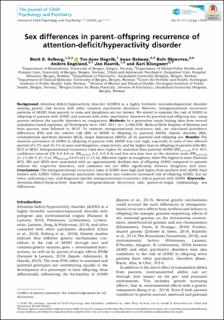| dc.description.abstract | Background
Attention-deficit/hyperactivity disorder (ADHD) is a highly heritable neurodevelopmental disorder sharing genetic risk factors with other common psychiatric disorders. However, intergenerational recurrence patterns of ADHD from parents to sons and daughters are not known. We aimed to examine the risk of ADHD in offspring of parents with ADHD and parents with other psychiatric disorders by parental and offspring sex, using parents without the specific disorders as comparison.
Methods
In a generation study linking data from several population-based registries, all Norwegians born 1967–2011 (n = 2,486,088; Medical Birth Registry of Norway) and their parents were followed to 2015. To estimate intergenerational recurrence risk, we calculated prevalence differences (PD) and the relative risk (RR) of ADHD in offspring by parental ADHD, bipolar disorder (BD), schizophrenia spectrum disorder (SCZ), major depression (MDD), all by parental and offspring sex.
Results
The absolute prevalence of ADHD in offspring of parents with ADHD was very high, especially in sons of two affected parents (41.5% and 25.1% in sons and daughters, respectively), and far higher than in offspring of parents with BD, SCZ or MDD. Intergenerational recurrence risks were higher for maternal than paternal ADHD (RRmaternal 8.4, 95% confidence interval (CI) 8.2–8.6 vs. RRpaternal 6.2, 6.0–6.4) and this was also true on the absolute scale (PDmaternal 21.1% (20.5–21.7) vs. PDpaternal 14.8% (14.3–15.4)). RRs were higher in daughters, while PDs higher in sons. Parental SCZ, BD and MDD were associated with an approximately doubled risk of offspring ADHD compared to parents without the respective disorders, and estimates did not differ significantly between daughters and sons.
Conclusions
The intergenerational recurrence risks of ADHD were high and higher from mothers with ADHD than fathers with ADHD. Other parental psychiatric disorders also conferred increased risk of offspring ADHD, but far lower, indicating a sex- and diagnosis-specific intergenerational recurrence risk in parents with ADHD. | en_US |

